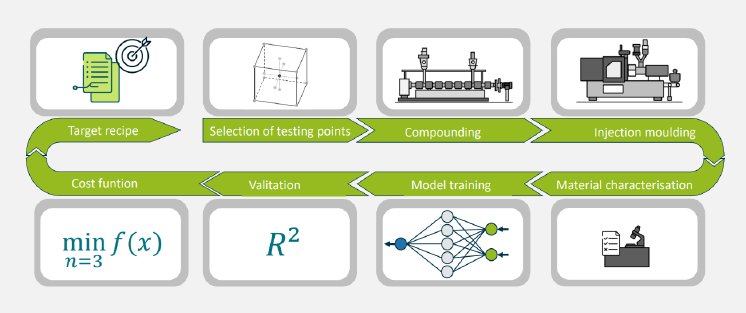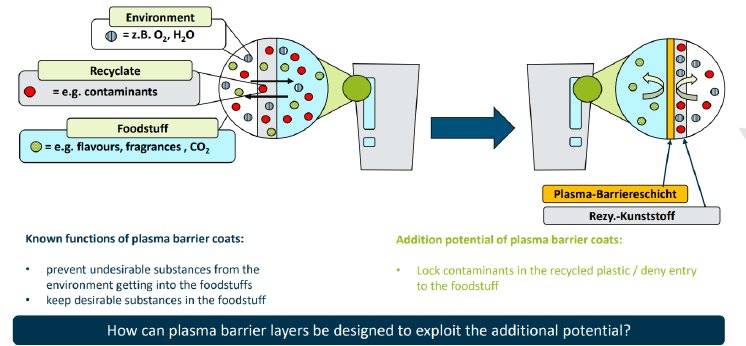Through the consistent use of recyclate as a component of plastic products, it is possible to drastically reduce emissions (such as CO2 or the discharge of macroplastic and microplastic into waterways) and also to cut back on crude oil requirements. However, this sustainable multiple use of valuable raw materials is not yet achieved in all areas. In the packaging sector, for example, only around 11 % of the recyclate is currently being used for the renewed production of packaging. Various factors are making this difficult, for example:
- limited availability of material with high enough purity
- fluctuating properties
- limited acceptance of plastics recyclate
- inadequate economic attractiveness of using recyclate
Holistic AI-based optimisation of plastic packaging containing recyclate
One such project is the "AI application hub, plastic packaging", within which IKV is pursuing several objectives in a sub-project entitled "KIOptiPack: Holistic AI-based optimisation of plastic packaging containing recyclate". The primary target is the provision, validation and application transfer of practically tested, AI-supported moulding tools for successful product design and the production of plastic packaging with a high recyclate content and the required quality. This is supported by an AI-application and data room and the creation of a central network platform (which integrates, for example, the consumers and their attitude) for added value engineering.
A concrete example of an AI-supported tool is compound development (Figure 1). Instead of an "iterative approach" to the desired viscosity of the compound, use is made of existing data points and – where necessary – the characterisation of extreme points, while an AI model describes the space between the data points. This produces a much better imaging quality (R² = 0.97) than, for example, a regression analysis (R² = 0.60).
This illustrates how AI can, from easily documented (or already existing) data, create added value and save plastics converters a great deal of time and expense in finding the ideal viscosity of the compound, so that they do not have to work extra shifts.
Nevertheless, with recyclate material, not only processing properties such as the viscosity have to be taken into account, but also the performance properties. For example, suitable measures have to be taken to protect goods packed in plastic from contamination through undesirable substances potentially contained in the recyclate. This is where extra shifts of a different nature are deployed:
Plasma barriers protect packaged goods
A highly promising platform for barriers is a surface coating with plasma-based chemical gas phase deposition. The deposited barriers also serve to prevent migration of harmful materials from the recycled plastics to the packaged contents (Figure 2). However, the development of such plasma barriers has so far advanced relatively slowly because of the analytical work involved in determining the barrier performance. Through a newly developed process at IKV, which is based on innovative model contaminants and a new approach to incorporating them into the plastics, the barrier effect can in future be evaluated much faster. Accordingly, the optimisation of the plasma barriers will also take less time so that, thanks to this, product safety can be achieved with minimum emissions – and without having to fall back on poorly recyclable multi-layer plastic composite films.
Circular economy at the 32nd International Colloquium Plastics Technology
At the Colloquium, Session 2 (AI-based methods to boost PCR usage in plastics packagings), Session 8 (Plasma-based barrier coatings for sustainable packaging) and Session 13 (Challenges of PCR processing), will deal with the topic of the circular economy and the use of recyclate , each with a keynote paper from the industry, plus two scientific presentations from IKV.
At "IKV 360° – Research live”, the research assistants will demonstrate the topic at various stations.


